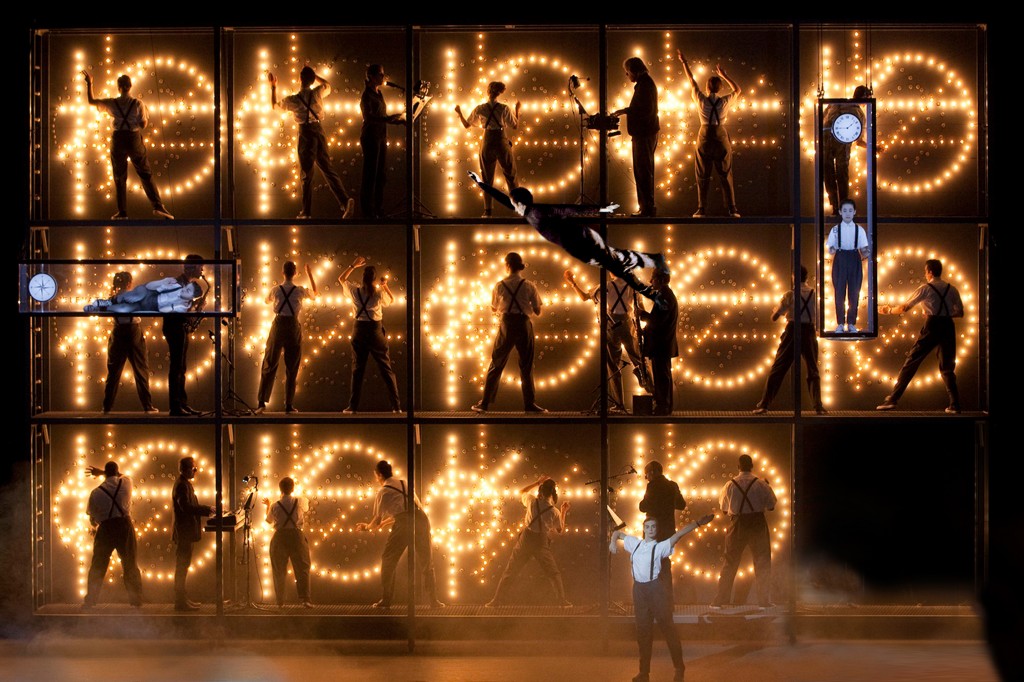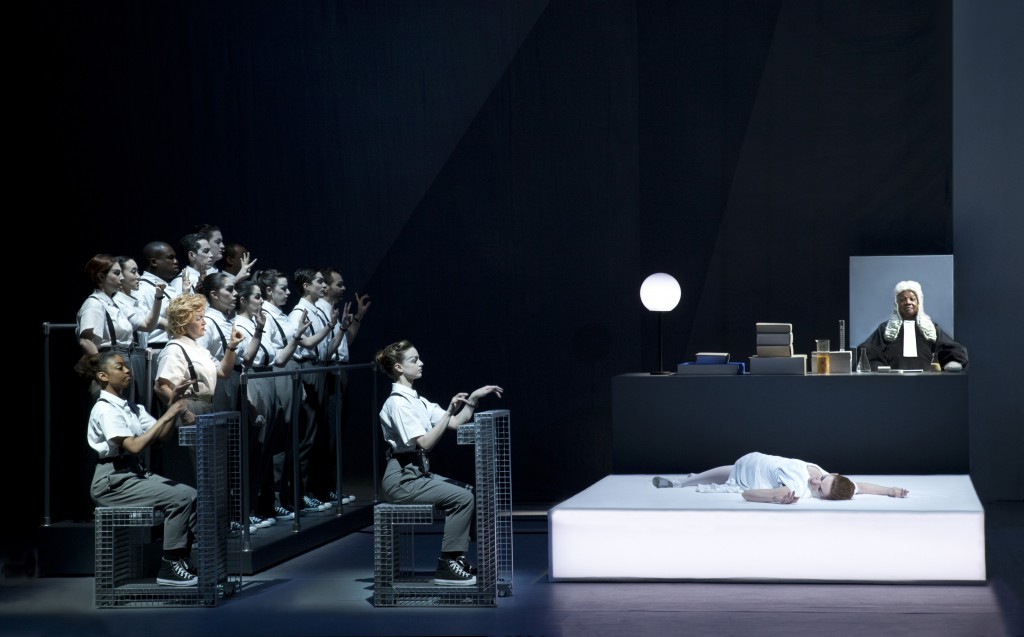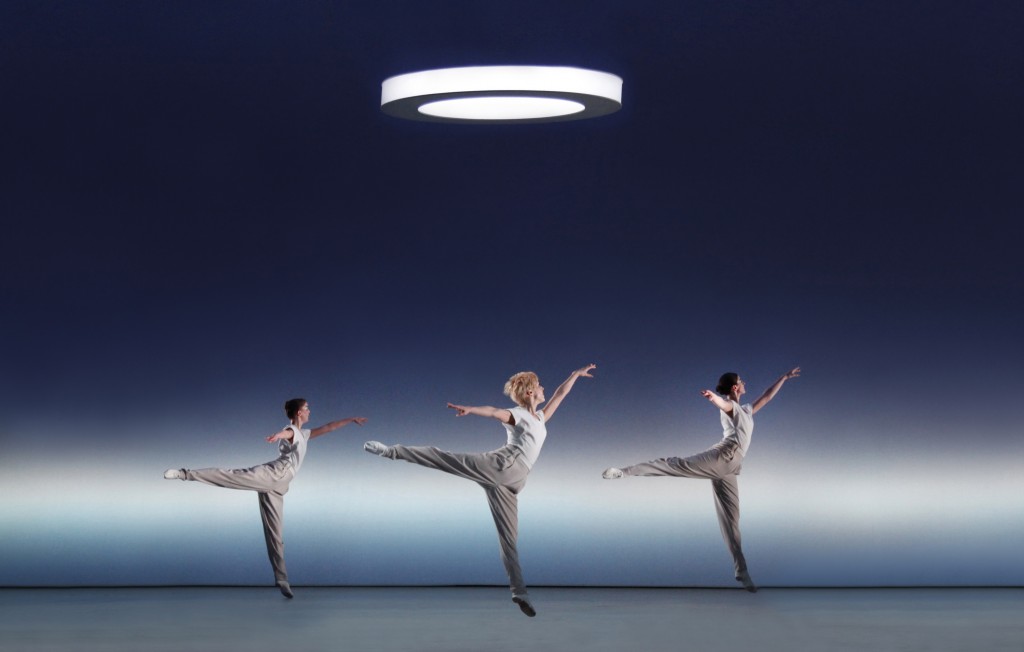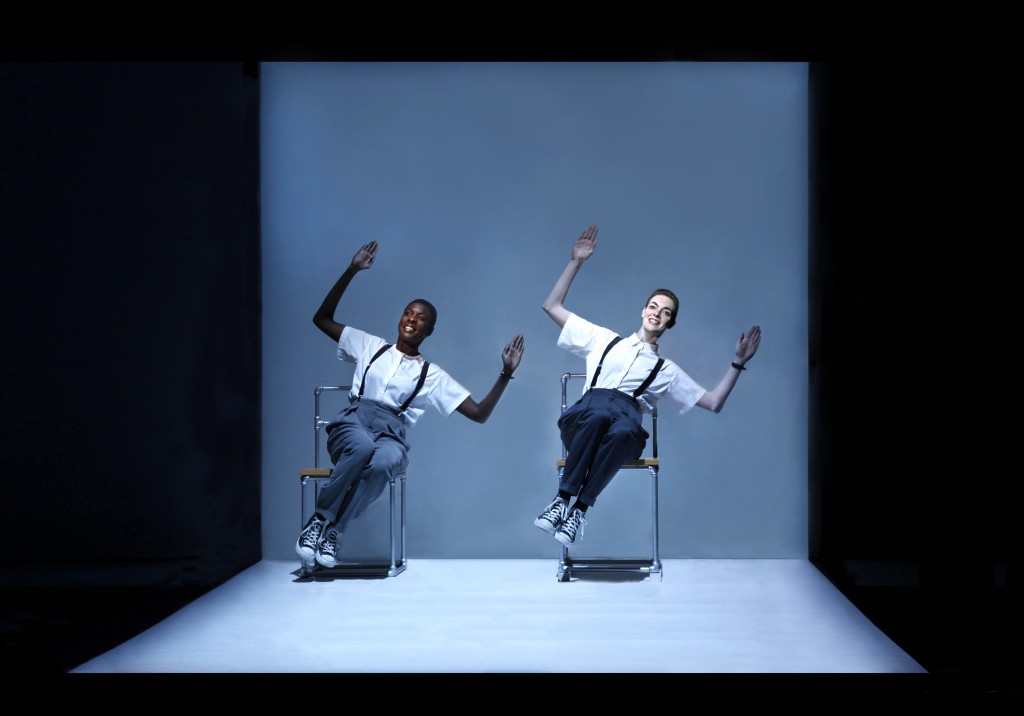Archive for October 2013
Philip Glass – Robert Wilson 20th-Century Masterpiece Finally Makes It to LA
Einstein on the Beach: An Opera in Four Acts
by Robert Wilson, Philip Glass and Lucinda Childs.
Spoken text by Christopher Knowles, Samuel M. Johnson and Lucinda Childs
With the Lucinda Childs Dance Company
The Philip Glass Ensemble conducted by Michael Riesman
Philip Glass (music/lyrics), Robert Wilson (stage direction/set design), Lucinda Childs (choreography)
Review by David Gregson, Sunday, October 13
A notable characteristic of postmodernism is its invitation into a world of extreme subjectivity on the part of the spectator. This is most certainly the case with Einstein on the Beach, the 1976 paradigm shattering collaborative “opera” by artist/stage director Robert Wilson, composer Philip Glass and choreographer Lucinda Childs. Wilson, perhaps for lack of a better term, calls this piece an opera, but it is not dramatic in any traditional sense, it has no plot, and it does not feature tenors and baritones and sopranos working feverishly to deserve our bravos. Wilson’s work as stage director, and as set and lighting designer, is intensely stylized, deeply ambiguous, highly evocative, and ultimately very mysterious. In Glass, Wilson finds his ideal collaborator.
Although never seen in Los Angeles until now, Einstein on the Beach is widely regarded today as the most significant new direction for opera during the late 20th century. Many opera lovers, including myself, have never had the opportunity of experiencing it. What we know comes largely from audio recordings, video clips, word of mouth and various biographical and critical writings. By now in 2013, its composer is world famous and a virtual grand old man of American music. We hear Glass works on innumerable movie soundtracks, while his symphonies and concertos pop up on concert programs everywhere. Locally, thanks to the Long Beach Opera, we have been able to see works such as the full-length opera Akhnaten and the shorter Tell-Tale Heart. Those who attend the Metropolitan Opera’s HD movie theater relays have also had the opportunity to see a fully-staged Satyagraha. There is a notable DVD of Kepler available from Amazon, and even a new release of the Walt Disney opera, The Perfect American. But for such an important and prolific composer of opera, Glass is definitely under-represented on video.
Robert Wilson’s work, regrettably in my opinion, enjoys much more exposure than that of Glass. Although Wilson is a stunningly imaginative artist whose stage pictures are often agonizingly beautiful and wonderfully pure, he almost invariably subverts the drama in the classic operas he has been invited to produce. His Gluck works, both Alceste and Iphigénie en Tauride, and his Wagner Parsifal and Puccini Madama Butterfly, all of which I have seen, have been self-serving, self-indulgent exercises that totally undermine the composers’ intentions, obfuscate the dramatic action, and force the singers to maintain absurd statue-like postures and to walk around like figures in an animated Egyptian frieze. However, when Wilson is liberated from the demands of the classics, he soars. I think “nothing” is his ideal subject matter.
Einstein, to be sure, is not exactly nothing — but for Glass and Wilson, he is merely an historical figure we hold in our minds as we watch the enigmatic and episodic pageant before us. As Wilson has remarked, the more we know about Einstein, the better. We bring our own knowledge, sensitivity, intelligence and emotions to the show. For this reason, Einstein is a different opera for every single person who experiences it.
Little or nothing in the spoken or sung passages enlightens us. Often the words cannot be fully distinguished. We hear much singing of numbers and solfège syllables (do, re, mi, fa, sol, la, ti). Choruses, songs, and instrumental passages are repeated countless times, most often with subtle or no-so-subtle variations. The stage action includes comic moments that border on vaudeville — or we see people inexplicably moving this way and that in stiff, mannered postures. Einstein sits on the sidelines endlessly playing his violin. At least twice, Childs’ dancers appear to do a series of rather simple but very beautiful rapid leaps and turns. Later we spend 10 minutes watching a long bar of light rise from the horizontal to the vertical. In another scene (“Night Train”), a nurse and a man romance on the end of a train while singing nonsense — just before she points a gun at him. A woman sensually repeats a strange poem 48 times, while two prisoners move around in a cell. A tiny rocket ship blasts off. Machine slaves, seemingly from Fritz Lang’s Metropolis, appear to manipulate a wall of circular yellow dials. Clocks and people float by. And we have trains, a bus, moving things. An image of an atom bomb. Eclipses of the moon. People endlessly executing everyday gestures with exaggerated flourishes.
The Poem: (Click for video.) ”I was in this prematurely air-conditioned supermarket and there were all these aisles, and there were these bathing caps that you could buy that had these kind of Fourth-of-July plumes on them that were red and yellow and blue, and I wasn’t tempted to buy one, but I was reminded of the fact that I had been avoiding the beach.”
Make of the entire opera what you will. It is compelling, boring, exciting, frustrating, farcical, absurd, profound — from moment to moment and all at the same time. The theory of relativity, for me at least, is quite specifically suggested, especially in the train imagery. Einstein himself used trains in some of his explanations of the speed of light.
Under and over and surrounding all this (thanks to amplification) is the Philip Glass Ensemble conducted by Michael Riesman. They achieve an amazing variety of sounds and textures throughout the performance. Costumed as Einstein seated stage left is violinist Jennifer Koh, sawing away her arpeggios most of the evening. Andrew Sterman plays a beautiful tenor saxophone solo. So many people are involved that I have included a link to the program to help Opera West readers sort it all out. And I speak about so much of this in the present tense because — well, it seems like an eternal show, a definitive presentation that has been and should be around for awhile. Sadly, this is likely the last we will see of it.
At my age, sitting still for 4 1/2 intermissionless hours was not possible. The performance began almost imperceptibly at 6:30 p.m. (it took a few minutes for the audience to realize the piece had started), and ended just before 11:00 p.m. As we had been told we could move in and out of the auditorium at will, I took my break at exactly 9:02 p.m., but literally stumbled over many legs and slippery programs. One not-so gentlemanly gentleman gave me hell for almost breaking my neck due to his inconsideration. Fearful of re-entering the auditorium from the same place I had just exited, I moved fully to the back of the orchestra seats — abandoning my companion. We were joyfully reunited before midnight and celebrated into the almost-wee hours with wine and conversation. I enjoyed it, my companion enjoyed it, and the audience seemed to love it. It will take sometime before this experience will be equalled.
See below for videos and the program.
Postscript
It is perhaps stating the obvious — but I’ll state it anyway — that the performing arts possess both a public and a private dimension: they present us with a shared experience and a private one. Particularly interesting in this regard is a work like Bizet’s Carmen, Los Angeles Opera’s 2013/14 season opener. On one level it is a social event that provides networking for donors and patrons; on another it is a gathering of people who, be they jaded opera-goers or eager newbies, are all seeking a kind of communal aesthetic epiphany. Virtually everyone knows at least a few of the famous tunes; almost everyone knows something about the titillating story. The audience enters an exciting arena in which all are part of what is going on.
Each subjective experience, of course, is totally different. Thoughts buzz about the brain. The singers are fabulous, they’re so-so, they’re simply dreadful; the production is great, not so great. I have heard and seen better. Buzz! The Escamillo makes me think, not of the story, but of my trip to Spain two years ago. And isn’t it terrible how gypsies are still being persecuted everywhere? Buzz! Actually, this whole damn opera bores me now and I’m sick of it. I have simply seen this thing too many times. But, I have to admit it’s a masterpiece. And yet I think Nietzsche was crazy to prefer Bizet to Wagner; yet what an interesting argument he had for Carmen. God, this stage director hasn’t an original idea in his head! I wish this company would do something new for a change, like a opera by Philip Glass.
Recognizing these highly subjective aspects of opera going, I long ago abandoned formal reviewing for the more personal so-called “blog,” which is what Opera West has become. I apologize to readers who expected something else.
This “special addition” to the LAO season was a touring revival of the groundbreaking 1976 collaboration by Robert Wilson and Philip Glass. The Los Angeles performances will be the final North American stop of the production’s international tour. It was presented in collaboration with the Center for the Art of Performance at UCLA (CAP UCLA).
The 2012-13 production of Einstein on the Beach, An Opera in Four Acts was commissioned by BAM; the Barbican, London; Cal Performances University of California, Berkeley; Luminato, Toronto Festival of Arts and Creativity; De Nederlandse Opera/The Amsterdam Music Theatre; Opera at Orchestre National de Montpellier Languedoc-Rousillon; University Musical Society of the University of Michigan. Orginally produced in 1976 by the Byrd Hoffman Foundation.
Produced by Pomegranate Arts, Inc.
CAST
Featured Performer: Helga Davis*
Einstein / Solo Violinist: Jennifer Koh*
Featured Performer: Kate Moran*
CREATIVE TEAM
Direction / Set and Light Design: Robert Wilson
Composer: Philip Glass*
Choreographer: Lucinda Childs
Conductor / Music Director of Philip Glass Ensemble: Michael Riesman*
Co-Director: Ann-Christin Rommen*
Directing Associate: Charles Otte*
Lighting Design: Urs Schoenebaum*
Sound Design: Kurt Munkacsi*
Costume Design: Carlos Soto*
Hair / Makeup: Luc Verschueren*
* LA Opera debut artist
Click here to view entire program
“Einstein on the Beach.” 2012. Live excerpts 2012 from Montpellier
Director and designer Robert Wilson, composer Philip Glass and choreographer Lucinda Childs discuss Einstein on the Beach. The talk is moderated by Cal Performances’ Director Matias Tarnopolsky and was recorded on October 28, 2012 at Zellerbach Playhouse. The West Coast premiere of Einstein on the Beach was presented by Cal Performances October 26-28, 2012 on the campus of UC Berkeley.





